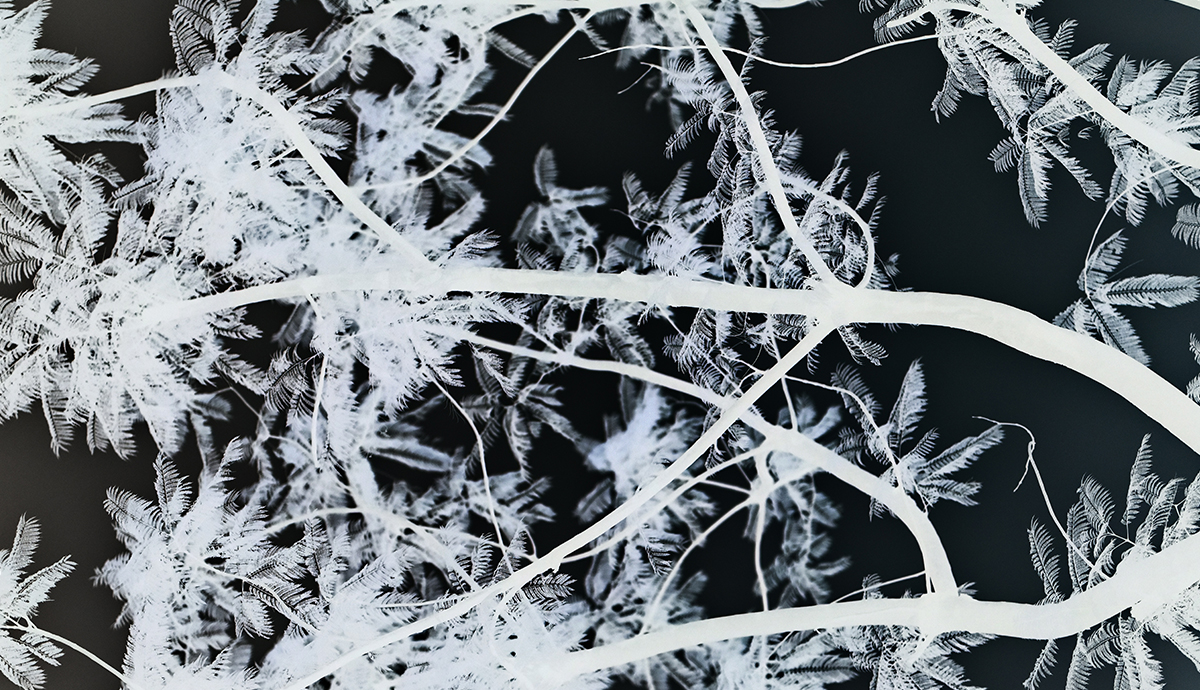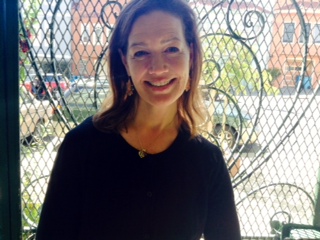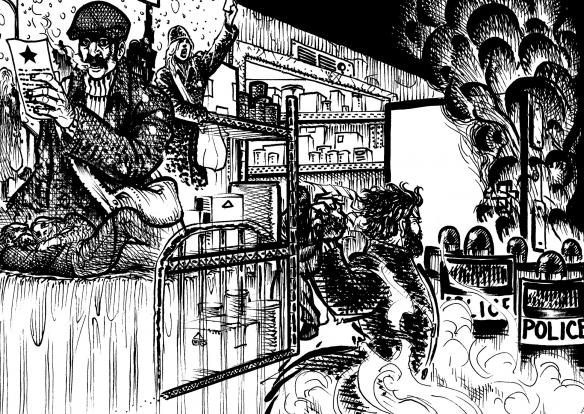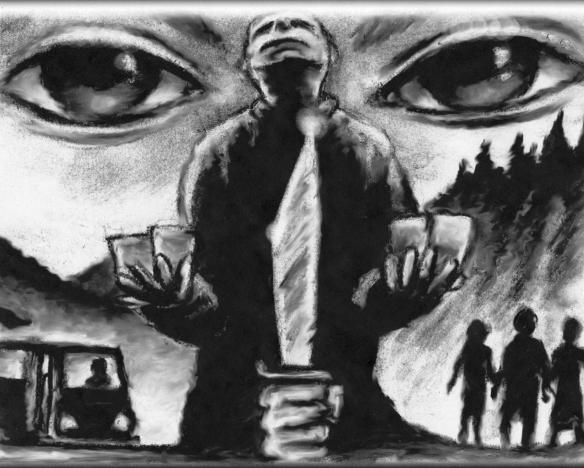"Pale Ghosts" Two
This weekend we started a series of three parts featuring Dolly Reynolds Tavasieff's nonfiction story beginning Friday November 7th.
I wrote this piece as a personal essay response to the murder of my mother in 1997. It seemed then such a huge and unmanageable subject, but writing "Pale Ghosts" helped me decide to attend grad school and focus on my writing in a serious way. I am now a 3rd year MFA student at San Francisco State and am working on a book length memoir about my family, the murder, and its aftermath.
I've been back to Connecticut twice this year to visit the reservoir where she was killed. The first time, in August, the reservoir seemed unbearably haunted; I thought the trees would reach out and grab me like in the Wizard of Oz. The second time, just last weekend, I went with the police chief who found my mother and stayed with her body all night. With his quiet, solid, decent presence, the reservoir became a beautiful, light-filled, and ultimately hopeful place. The two trips made me see that spectral visits and hauntings depend a lot on our earthly circumstances and frame of mind.
Here is part two of "Pale Ghosts" from issue 292.5, September-October 2007.
II.
When I was eleven we moved into an old farm house near the Berkshires. There was a barn for our horses, a tree house, and a brook that ran swift and deep. The house sat at the top of a hill and was painted yellow, like the sun. The move was supposed to be salutary—a balm for my mother’s growing sense of desperation. There was, however, one terrifying side effect: my father did not come with us when we moved.
“Lots of couples have this arrangement,” my mother assured my sister and me. The creases around her lips were hard now, and small flakes of her lipstick dotted her chin. “Or else they wish they did,” she laughed, the harsh sound catching in her chest like a slap.
Inside, the house needed work. There was only one bathroom, and the stairs were so narrow the movers had had to hoist our furniture upstairs through a second floor window. My mother hired a local builder, David: a skinny, greasy man who wore his cracked leather tool belt low on his hips. Soon, David’s rust-colored van arrived in our driveway early each morning, at the same time my mother was drawing her bath.
“It’s funny,” I heard Mom say to my grandmother at dinner. “If the oil man or the plumber parked his truck in my driveway for hours, the people in town would think we were having an affair. Bu David’s van can sit there all day, and no one suspects a thing.” My mother licked her lips and smiled, the light glinting off her small pointed teeth. She sucked the ice from her gin and tonic and crunched, giggling when the cold liquid ran down her chin and dripped onto her slender neck.
Our new house was lousy with ghosts. It didn’t take long for them to make their presence known. They started playfully enough, turning lights off and on, fiddling with the volume on the radio, and opening doors as we walked past them. Then silverware started clattering on the buffet during dinner. A marble clock leapt over the music stand on the piano. Lamps shattered. Once, when we had guests for dinner, a jade Buddha flew from its perch on the window sill and landed right in the center of the living room rug.
These ghosts seemed meaner than the rice ghost had been, more like playground bullies. They loved to taunt the people who were most afraid. Soon, no one wanted to spend the night except our intrepid neighbor, Lacey, who kept her horses with ours in the field. One afternoon Lacey brought over an OUIJA Board, which we took to the scariest place of the house: the far end of the basement. The basement ran beneath the entire length of the house. It had a cement floor and the original stone walls. Discarded snake skins poked out of holes between the mottled rocks. The only light came from a single bulb suspended form a hanging cord.
Lacey asked the questions, while my sister and I placed our fingers on the heart-shaped pointer and waited.
“Has anyone ever died in this house?” Lacey asked, trying to make her voice sonorous and deep. After a minute, the pointer moved slowly to “Yes.”
“Are you moving it?” Lacey asked.
“Not me!” I swore.
“Not me!” My sister swore.
Lacey began again, deep-throatily. “How many people have died in this house?”
Here the pointer moved first towards the number “6”, and but then veered off to stop at “8”.
“What were the names of the people who died?”
The pointer moved quickly to spell out, I-S-A-A-C-T-U-L-L-E-R”, and then paused, then “H-I-S-W-I-F-E”, and then the lights went out.
No one has ever run as fast as the three of us did that afternoon, in the dark, trying to find the stairs. We didn’t stop screaming for hours. I never went down into that basement again. For all I know, the OUIJA board is still there, spelling out names in the dark.
There was a girl in my sister’s 5th grade class whose grandparents were well-known Connecticut ghost hunters. When they visited their granddaughter’s school, they told my sister they already knew about our house. It was located near a major crossroads and had apparently been used as a prison during the Civil War. Several people had died in the house, violent deaths, but the spirits hanging around were more rambunctious than malevolent. Isaac Tuller, they said, owned the house and operated a pub out of its kitchen, called Tuller’s Tavern. The ghost hunters’ advice was not to do anything that would stir things up and we’d be fine. We should be especially sure, they said, not to fool around with an OUIJA board because sometimes, you could invite a more sinister element into your house.
Which we had already done.
That winter, as David’s van sat parked in the driveway dripping oil onto the snow, things started happening to our animals. Our dog was hit by a car that ripped open her lung. Our sweet calico cat disappeared. After searching for days I finally found her half-frozen at the bottom of the hill, blood seeping out of her nose. Things were happening to my body, too. My breasts bulged out of their training bra and my corduroys were strained across my hips. I was growing bigger than my lithe mother, and my father would no longer hug me on his infrequent visits. “Disgusting,” I once heard him whisper to my mother, as I lumbered past them in the kitchen, my thighs rubbing together. “Disgusting,” I began to whisper to myself, every time I looked in the mirror. I imagined other people saying to themselves as I passed them on the street.
David was at the house more and more. He was building my mother an enormous king-sized bed, so high off the ground she needed a step stool to climb up. Some days he’d bring his four-year-old daughter, and it was my job to take her to the barn, let her play with the horses, and be sure not to come back for three hours. My sister had nightmares about David; she woke up screaming night after night. I despised everything about him: the flakes of dandruff that clung to his greasy hair, his filthy yellow teeth, his cruel, sneering mouth, and the hold he had over our mother.
There was an ice storm that winter, a long and brutal siege that drowned power lines and shut the schools for more than a week. Our paddock was glare ice; we had to keep the horses in their stalls for days. When the thaw finally came I tacked up my mare April and mounted. As soon as I had settled into the saddle, April bolted, galloping out of control of the ring and toward the power lines, pitching me head first down the hill. When I came to I had lost all my vision except for a narrow strip at the top and bottom of my vision field. Everything in the middle was a blur.
“Dolly!” My sister was screaming. I knew she was running towards me but I couldn’t see her at all. I rolled to my side, then up on hands and knees, and then slowly stood up, my hands over my eyes.
“I’m going up to the house. Put April away.”
“Are you okay?”
“I can’t see.”
My mother met me halfway up the hill. “You have to get back on,” she said, her hands on her hips. My mother didn’t ride; she didn’t know anything about horses except the maxim about getting right ack on the horse after you fall off. “Get back up on that horse, right now.”
“I can’t!” I cried, turning from her and making my way slowly up the hill to the house and my bed, where I lay for the next three days, vomiting uncontrollably. When it was over, I couldn’t move my neck. My mother referred t me as “Camille”, though she relented after a week and brought me to the doctor, who ordered a CAT scan of my head, still a new test at the time. The scan showed that there had been some bleeding into my brain, but it was resolving and I was going to be fine.
But I wasn’t fine, not at all. Day after day I lay on the couch in our play room, tears seeping out of my eyes and running into my ears. I didn’t get dressed. I didn’t go to the barn. I refused to go to school. The only time I got up at all was to make myself cinnamon toast, slice after slice of it, slathered with butter, stuffing myself until my eyes swelled up and my thighs grew together, though I knew that my father despised, above all else, girls who were fat.
I kept thinking about what the ghost hunters had said, about how we had invited evil into the house that day in the basement with the OUIJA board. I thought about April, my good, gentle mare with her beautiful brown eyes, who nickered every time she heard my voice. II replayed the moment where she bolted out of the ring over and over again, thinking about how my sweet mare had nearly killed me. I was terrified of her now. I shook when I was near her, my hands trembling on the pitchfork as I cleaned her stall and tossed her hay.
The ghosts tormented me at night, turning the TV on, opening drawers, and flashing the lights, while I lay sleepless on the couch, paralyzed with terror. Some nights I imagined calling the police, but what would they do? It was the people who didn’t exist I was afraid of. One especially bad night, the ghost kept knocking on my bedroom door, until I ran into my mother’s bedroom in a blind panic. The knocking continued.
“Mom, do you hear that?” I whispered, shaking her in the dark.
“It’s just the ghost. Go back to bed.”
“I can’t, I’m so scared.”
“It’s the ghosts inside of you you’re afraid of,” my mother said. “You have nothing to fear from the ghosts in the house.”
A few months later my parents decided to sell the horses and send us to boarding school. It was many, many years before I would sleep in the house again, even with all the lights on.
Dolly Reynolds has a JD from UC Hastings and is currently an MFA student at San Francisco State. Her work has appeared in many literary journals and has been nominated for a Pushcart Prize. She works as a veterinary nurse and lives in San Francisco by the ocean with her husband and their twin daughters. Dolly’s essay appeared in the North American Review September-October 2007 issue.
Top Illustration by: Midwest transplant freelance artist Jared Rogness, now settled into California’s Central Valley, is currently working on creator-owned comics and editorial art. This image is featured in the North American Review September-October 2007 issue.
Bottom Illustration by: Jose Guajardo is from San Antonio, Texas, and has a Master of Fine Arts from Southern Illinois University. He is and advocate for the Chicano movement and has a profound passion to teach. Jose is featured in North American Review September-October 2007 issue.
Recommended
Nor’easter
Post-Op Appointment With My Father
Cedar Valley Youth Poet Laureate | Fall 2024 Workshop








